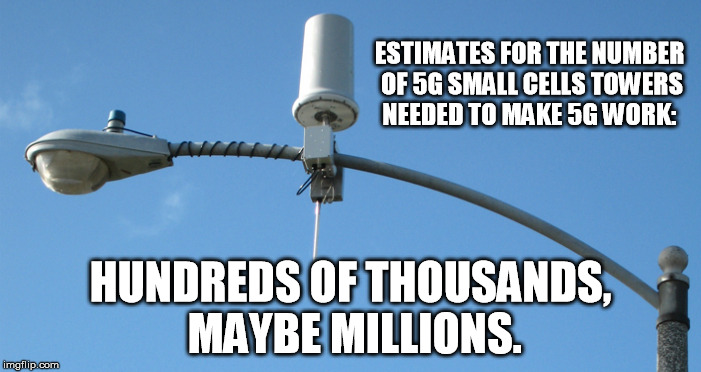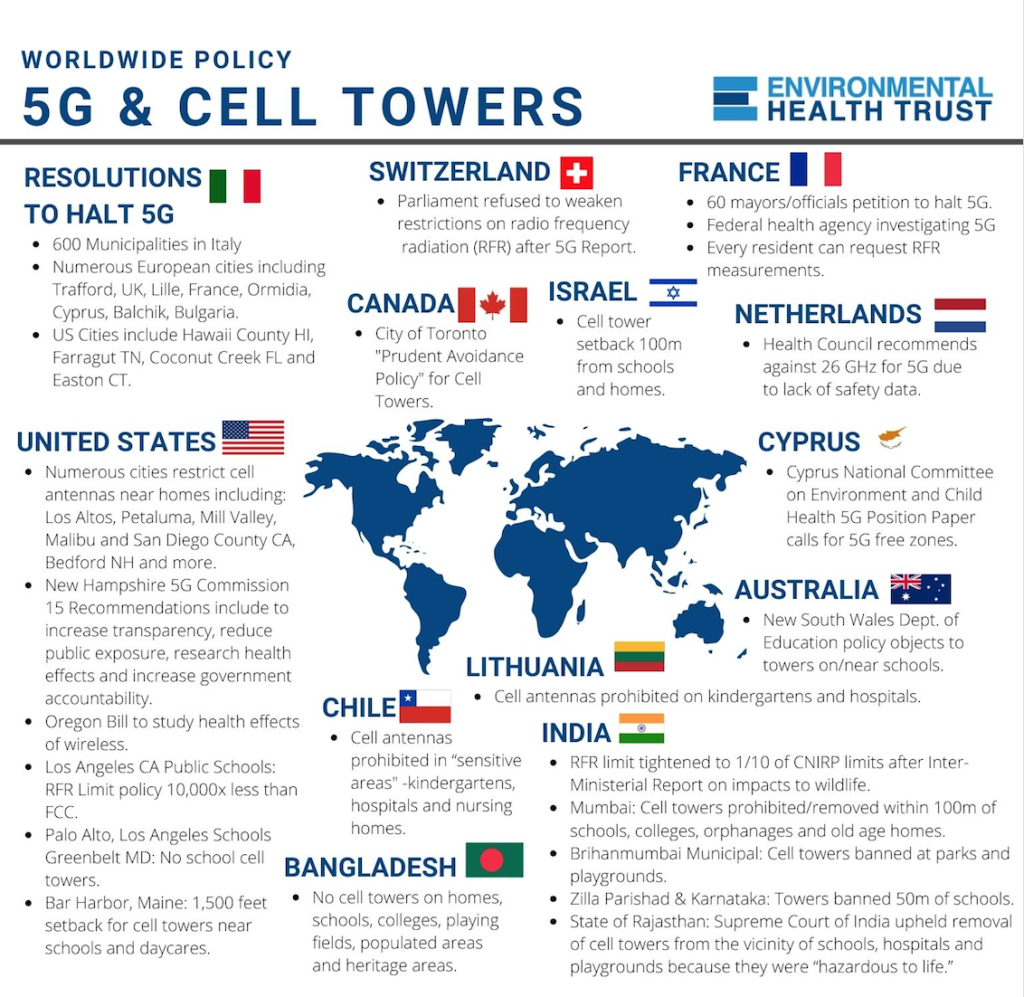 By B.N. Frank
By B.N. Frank
American opposition to both 4G and 5G small cell towers being installed near homes, schools, and everywhere else is NOT new. So, yeah, proponents might recommend camouflaging it.
From Agl Media Group:
5G Deployments Demand Improved Small Cell Camouflage
January 26, 2021
The FCC C-band auction is offering mid-band 5G spectrum that is thought to have a compelling balance of higher speeds with solid signal propagation. When deployed, this spectrum will join millimeter-wave (mmWave) technology in small cell development in urban and suburban areas.
5G small cell sites are already appearing on busy city streets, historic sites and neighborhoods, co-existing on lighting poles and within other forms of street furniture on rights of ways to maximize coverage.
“Typical small cell sites mount the 4G/5G antennas or radios at the top of the pole to optimize performance, often using concealment,” said Apostolis Sotiriou, assistant VP of sales, Raycap. “The challenge is to maximize the antenna performance, while ensuring it is not visually disruptive.”
With one or more small cell sites destined for virtually every block, how can antennas hide in plain sight, without blocking the crucial radio waves? Fortunately, a new concealment material called InvisiWave is now available that can completely conceal 5G radios with minimal signal loss.
“We create concealment solutions designed and manufactured for either macrosites or for small cell sites, where the material in front of the new antennas is friendly enough to RF propagation that it doesn’t introduce losses,” Sotiriou said. “You need to make sure that those antennas are properly hidden behind some type of construction, which might be a radome or a shroud. We can also create pretty nice screen walls, which can be painted, and installed at the top or on the corner of a building.”
The pole topper should have a uniform form factor that can host different brands of 5G mmWave radios, as well as be backwards compatible with lower frequency band, he added.
Raycap has also introduced a drop-in 5G small cell panel upgrade for concealed 4G deployments that uses the InvisiWave technology. The panel replacement allows existing concealed wireless sites to be upgraded for 5G, by replacing a small portion of the existing wall structure (an aperture) with a camouflaged screen panel to conceal 5G mmWave equipment.
“Carriers across the United States operate thousands of 4G sites on rooftops and in other concealed areas which, until now, were prohibitively expensive or technologically infeasible to upgrade for 5G while meeting strict aesthetic and electronic regulations,” said Raycap SVP of telecom sales Kelly Richards. “For the first time, operators can seamlessly and cost-effectively bring 5G to communities, by simply retrofitting these types of existing installations.”
With propagation distances in the hundreds of feet, mmWave antennas are being deployed in hotspots, city centers, airports and around stadiums, among other places where large numbers of people are expected to be walking around.
The electronics that support the radios, including AC power and disconnect, fiber management, and cooling equipment, are located below the top of the pole, most often in side-mounted enclosures. However, some municipalities may not like the effect on aesthetics, and it can present wind load problems. In that case, the equipment can be moved to an enclosure at the base of the pole.
An octagonal (clamshell) enclosure can be installed around the base to hold the electronics, which is consistent with the pole design and minimizes the impact on the right of way.

The electronics can be hidden in an enclosure, up to 20 feet away, engineered to look like a trash can.
“For this reason, Raycap manufactures clamshell enclosures to the pole’s specific dimensions, with specified finish and color to match the pole and be consistent with aesthetic regulations,” Sotiriou said.
Or, the electronics can be hidden in an enclosure, up to 20 feet away, engineered to look nearly identical to other trash cans in the vicinity, such as the ones Raycap has manufactured for various park sites. The enclosure, measuring 46-inches tall and 28-inches in diameter, inhabits the bottom, while the top section can be used for trash.
“This wide range of form factor options – integrated pole, clamshell, cylindrical cabinet, trash receptacle and others — gives carriers and tower companies great flexibility in siting small cells anywhere they are needed for expanding mid-band 5G services. While poles are ideal, they are not the only possible locations,” Richards said.
High-speed internet is achievable, safer, and more secure with a hard-wired internet connection – not 5G or WiFi.
Cities AND entire countries have taken action to ban, delay, halt, and limit 5G installation AS WELL AS issue moratoriums due to health, safety, environmental and economic risks. There is research that has indicated that 5G is NOT SAFE. The majority of scientists worldwide oppose deployment. Despite increasing expert warnings and opposition, it’s still being installed where it hasn’t been banned. Your neighborhood and your yard may be next. Americans opposed to 5G deployment may sign this letter asking President Biden and Vice President Harris to stop deployment.
Activist Post reports regularly about 5G and other unsafe technology. For more details visit our archives and the following websites:
- 5GCrisis
- 5GFree
- 5G Information
- Stop 5G International
- 5G Space Appeal
- The 5G Summit
- WhatIs5G.info
- Electromagnetic Radiation Safety
- Environmental Health Trust
- Physicians for Safe Technology
- Wireless Information Network
Subscribe to Activist Post for truth, peace, and freedom news. Send resources to the front lines of peace and freedom HERE! Follow us on Telegram, SoMee, HIVE, Flote, Minds, MeWe, Twitter, Gab and Ruqqus.
Provide, Protect and Profit from what’s coming! Get a free issue of Counter Markets today.


